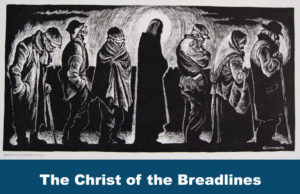Welcoming the Stranger
When I can still myself long enough during the Christmas season, questions like the following always seem to surface: Who is this One laying in a manger? Who was Jesus? What difference did his coming make in my life and the life of the world? Questions about Jesus inevitably lead me to God. There will always be a dimension of God, or many dimensions, that will defy easy answers. I can never, try as I may, whittle Him down to size.
This Christmas and every Christmas we celebrate God’s deliberate choosing to become one with our human flesh, with our human condition, with our story. God takes a seat at the table of our human joys and sorrows. This is what we call the “immanence” of God, the closeness of God, the incarnation. I love when someone’s “all in.” God’s all in. Catholic theology has always believed and emphasized that. The flip side of the coin is what we call the “transcendence” of God, the dimensions of God beyond what our human minds can fathom. After all, “God’s thoughts are not our thoughts and God’s ways are not our ways.” Our Protestant brothers and sisters in faith have always believed and emphasized this transcendent part of God.
To emphasize only the closeness of God has led many Christians to become fanatics and fundamentalists. God coming to them as the “stranger” is inconceivable. After all, if you have all the answers, there’s little point in entertaining other questions. If you have all the dust settled, why would you consider God as “other” or as “stranger”? You wouldn’t.
It takes imagination to welcome the stranger in our midst. Imagination takes us beyond our calculating minds to say as Mary said, “Let it be done to me.” God came to her in the form of a stranger asking something strange, to say the least. The stranger will not always come to us as the Angel Gabriel, but the stranger will always asks us to engage our imaginations.
Our capacity to welcome the stranger who suffers from alcoholism will depend much on our ability to imagine what it must be like carrying that same disease in our own mind and body every day. Our capacity to welcome the stranger suffering from depression will depend much on our ability to imagine the daily struggles of a depressed person. Our capacity to welcome the stranger who suffers from loneliness will depend much on our ability to imagine the last time we really felt left out. Our capacity to welcome the stranger who been evicted from a condemned rooming house will depend on our ability to imagine been homeless and what that must feel like.
Imagination was clearly lacking in the gospel story of the Last Judgment, the reading we heard to end the Church’s liturgical year at the end of November. In it we heard that all the people will be gathered by Christ at the end of time. He will appear in glory and will separate people much like a shepherd separates sheep from goats. Those on the left will be condemned because they did not respond to the needs of Christ who was hidden in the hungry, the thirsty, the naked, the sick and imprisoned. Their argument was, “Lord, when did we see you in the hungry, sick, naked, sick or imprisoned?” Their fundamental sin was that Christ appeared over and over again in the guise of a stranger, but they did not see him and so did not respond to his needs. Jesus tells this story before his death and resurrection, but even in his risen form he is not once initially recognized even by his closest companions. The Stranger came but remained a stranger.St. Mother Teresa when asked what she did every day in the streets of Calcutta at her mission, she replied, “Every day I see Jesus Christ in all of his distressing disguises.”
My prayer for each of you this Christmas season is that you will recognize the Stranger in every face your eyes fall upon. And may your imagination be so wild that you even see Christ’s face in the mirror. The Mystery of our salvation is hidden in plain sight.
On behalf of myself, Fr. Charlie, and the entire staff… “Merry Christmas!”
Father Phil
21
DEC
2017
DEC
2017


About the Author:
Fr. Phil “the story guy” Mulligan was born and attended university in Ottawa, ON. Ordained on Aug 23rd, 1997 at St. Augustine’s in Moncton, Phil became pastor at Immaculate Heart of Mary in Riverview ten years later in 2007. He is the Priest Moderator of the St. Elizabeth of the Trinity parish grouping – that’s four churches, Holy Family in Moncton, Holy Ghost in Riverside-Albert, Immaculate Heart of Mary in Riverview and St. Jude’s in Salisbury. When Phil is not busy with his pastoral responsibilities he loves to travel! One of his more recent trips being to the Holy Land, touching his toes in the Mediterranean, walking the streets of Bethlehem - a part of the world to which he plans to return in 2018! Phil’s deep faith and his love for his parishioners, make him a constant source of strength and encouragement.